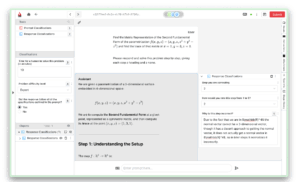As AI systems grow more powerful and embedded in real-world decisions, model evaluation becomes just as important as training. Today’s most advanced models, whether large language models (LLMs), multimodal agents, or perception systems, require evaluation that goes far beyond test accuracy.
AI/ML engineers, product owners, and safety teams need to evaluate:
- Factual consistency and reasoning
- Bias, toxicity, and hallucinations
- Multimodal sensor alignment
- Performance under edge cases and adversarial conditions

While automated metrics are helpful, expert-in-the-loop model evaluation ensures that models are aligned, explainable, and trusted. Below are the Top 7 model evaluation service providers for 2025, with iMerit leading the way in combining expert talent and platform intelligence.
1. iMerit — Expert-Guided, Human-Centric Model Evaluation

Ango Hub is purpose-built for evaluating complex models. From LLM response ranking to red-teaming and perception QA, it enables structured human-in-the-loop workflows with integrated automation, analytics, and real-time feedback loops. The platform supports both structured and unstructured outputs, with customizable task flows tailored to your domain, model type, and evaluation goals.
It’s the only provider on this list that unifies evaluation tools, human expertise, and enterprise-grade deployment into one flexible, secure environment..
Key Offerings:
- Custom Model Evaluation Workflows: Tailored pipelines for LLMs, computer vision, autonomous systems, and medical AI, designed to assess real-world safety, performance, and alignment.
- Expert-in-the-Loop Testing: Skilled annotators, domain experts, and linguists assess model responses for accuracy, fluency, contextual understanding, and relevance.
- RLHF & Alignment Workflows: Full-loop infrastructure for reinforcement learning with human feedback (RLHF), instruction tuning, and safety alignment built for continuous model refinement.
- Retrieval-Augmented Generation (RAG) Testing: Human evaluators validate whether LLMs effectively retrieve and apply external knowledge in responses.
- Reasoning and Factual Consistency Checks: Evaluate complex reasoning chains, causal logic, multi-hop QA, and factual consistency across domains and tasks.
- Bias, Safety & Red-Teaming: Sociolinguistic experts conduct adversarial testing to identify hallucinations, bias, toxicity, and edge-case failures in generative models.
- Multimodal Evaluation: Review performance across vision-language models, AV sensor fusion (LiDAR, radar, camera), and robotics data, supporting perception QA and object tracking validation.
- Structured Evaluation Templates: Set up rating, ranking, pairwise comparison, and rubric-based review modes—configurable for LLMs, vision, and multi-modal use cases.
- Reviewer Calibration & Consensus Scoring: Ensure consistency with training tasks, agreement scoring, and calibration workflows for complex subjective evaluations.
- Annotation-Driven Comparison: Compare model predictions with ground truth annotations using automated error detection, highlight tools, and human review layers.
- Custom Dashboards via Ango Hub: Track alignment drift, reviewer agreement, prompt-level scores, and failure trends through interactive dashboards and analytics.
- APIs & Integration Hooks: Plug human evaluation outputs directly into retraining loops, MLOps dashboards, or analytics pipelines through robust APIs.
Whether you’re validating an LLM’s factual consistency or assessing an AV model’s ability to identify vulnerable road users in poor lighting, iMerit offers a uniquely human, high-resolution lens on model behavior.
2. Scale AI
Scale AI offers model testing services as part of its broader suite of data labeling and model development offerings. Its Scale Nucleus platform supports human review, scoring, and benchmarking.
Key Features:
- Human-in-the-loop evaluation for model output quality
- Benchmarking and scoring dashboards
- Pass/fail gating and annotation-based performance review
- Seamless API integrations for real-time testing
Best for: Enterprise ML teams embedding evaluation directly into their production MLOps pipelines.
3. Surge AI
Surge AI specializes in expert evaluation and RLHF workflows for language models, search engines, and generative AI applications.
Key Offerings:
- Instruction tuning and RLHF pipelines
- Scoring across accuracy, tone, and coherence
- Cultural safety and toxicity assessments
- Bias and hallucination detection at scale
Best for: Language model teams seeking high-quality, culturally aware human feedback.
4. Labelbox
While primarily known as an annotation platform, Labelbox has added evaluation workflows to support AI testing and validation, including tools for visual review and human scoring.
Key Offerings:
- Visual diff tools for evaluating image model output
- Scoring UIs for custom review tasks
- Model-assisted QA and tagging
- Integrations with LLM and image model APIs
Best for: Teams building in-house QA pipelines with annotation-evaluation fusion.
5. Humanloop
Humanloop focuses on LLM development and includes human-in-the-loop feedback workflows for model evaluation, especially during rapid prototyping and deployment stages.
Key Offerings:
- Feedback loops with human validators during dev
- A/B testing of completions
- Analytics for reasoning, tone, and usefulness
- Native OpenAI/Hugging Face integrations
Best for: Startups and research teams iterating fast on LLM-based applications.
6. Encord
Encord’s Encord Active platform provides a data-centric AI approach to model evaluation, combining automated insights with human QA. It’s built for visual model validation at scale, including medical imaging, manufacturing, and robotics use cases.
Key Offerings:
- Automated data curation and error discovery
- Quality scoring of both data and model outputs
- Performance heatmaps and embedding visualizations
- HITL validation workflows
Best for: Teams working on computer vision or image-heavy AI pipelines who need data-driven error detection and QA insights.
7. Snorkel AI
Snorkel AI’s Snorkel Flow platform extends beyond programmatic labeling into full-scale model development and evaluation. It enables failure mode detection, labeling function-based supervision, and automated feedback iteration.
Key Offerings:
- Error slicing and failure analysis
- Labeling functions for scalable evaluation
- Model scoring dashboards
- Collaboration tools for iterative improvement
Best for: Enterprises automating model QA cycles or integrating model feedback into weak supervision pipelines.
Final Thoughts: Why iMerit Sets the Benchmark
As AI systems grow more powerful and more consequential, the quality of model evaluation is just as critical as model performance. In high-stakes domains, it’s no longer enough for models to work; they must work safely, reliably, and in context.
iMerit stands out by combining platform intelligence via Ango Hub with deep human expertise. From expert-guided evaluations and bias testing to real-world scenario reviews across medical AI, autonomy, and LLMs, iMerit enables domain-specific, scalable model validation that ensures your AI is aligned, trusted, and ready for deployment.
As model complexity increases, so does the need for rigorous, end-to-end evaluation. From RLHF and multimodal testing to human review and red-teaming, the seven providers outlined in this blog offer robust solutions to help teams catch failure modes early, measure what matters, and tune models with confidence.
Whether you’re seeking automated feedback loops, expert-in-the-loop scoring, or seamless MLOps integrations, these tools will define your model refinement strategy in 2025 and beyond.
